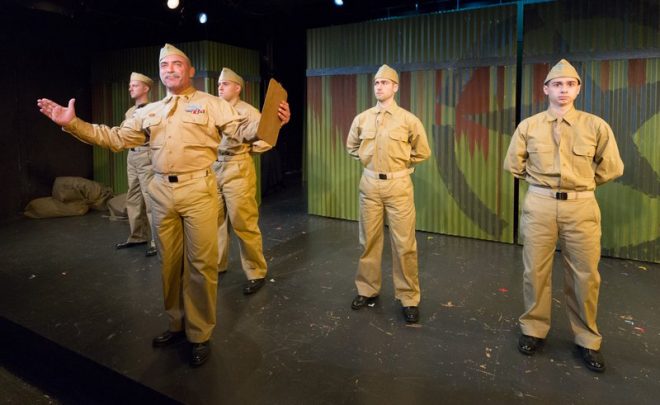
Biloxi Blues by Neil Simon. Tony Braithwaite directs at Act II Playhouse, Ambler, PA, through September 30, 2018.
This production of Biloxi Blues is the perfect memorial to Neil Simon.
That’s because the play depicts a youngster — resembling Simon — who takes notes about action that swirls around him, with the intent that someday he’ll become a playwright. He repeatedly steps forward to comment on the happenings. In other words, this is a portrait of the artist as a young man.
Some observers have mistaken Biloxi Blues as autobiography. That’s incorrect. It’s a carefully-crafted drama set at an army base in Mississippi early in World War II, where draftees are in training while worrying whether they’ll be shipped to fight the Nazis in Europe or the Japanese in the Pacific. Thus we witness comedy against a backdrop of mortal fear. Neil Simon was only 14 years old when the United States entered the war, and he was never in danger of being sent to fight. Biloxi Blues is fiction, although drawing on things that Simon observed throughout his life. The play was written in 1985, during Simon’s later years.
When the play convinces audiences that its events actually occurred, that’s a compliment to Simon’s skill as a storyteller.
Essentially, Biloxi Blues centers on Simon’s role as an observer of life around him, as a chronicler — as a man developing into a playwright. And that’s why it makes a good choice as a tribute to Simon’s career. Tony Braithwaite, who has acted in many of Simon’s plays, directs this production. The author’s death came unexpectedly, just before opening night, although he was 91 and had been in poor health.
Simon was berated by critics for superficiality, and for emphasizing humor over serious substance. But audiences loved his work more than professional critics did. I had the pleasure of seeing his first two hits on Broadway: Come Blow Your Horn (1961, starring Hal March) and Barefoot in the Park (1963, starring Robert Redford and Elizabeth Ashley as a newly-married couple). His characters were quickly identifiable to the young people of that time.
Simon took the prevalent format of domestic comedies by S. J. Perelman, George S. Kauffman and Moss Hart and gave the genre a new twist. Simon’s characters were more modern, more working-class, and more neurotic. His main players have obvious faults. They are insecure people in relatable situations, coping with adversity by cracking jokes.
Biloxi Blues is an ensemble piece, although two of the characters demand special attention. Twenty-year-old DJ Gleason plays the Simon character, Eugene Morris Jerome, with innocent charm. He seems natural and vulnerable. The muscular Andrew Criss is imposing as the tyrannical sergeant. Zachary Chiero, Ryan Hagan, Chris Monaco, Luke Bradt and Michael Rizzo are fine as the other soldiers. Heather Plank is effective as the whore who initiates Eugene in sex, and Anne Wechsler is ideal as the surprisingly literate Mississippi girl who kindles his real affection.
Adam Riggar’s set and Janus Stefanowicz’s costumes are serviceable, if you will pardon the army pun. Braithwaite’s direction presents well-paced contrasts between quiet introspection and broad comedy. As usual at Act II Playhouse, every seat is close to the stage and all the dialogue emerges intimately.